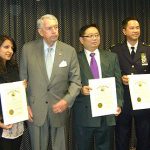Before the performance began for “Revisiting Vincent,” the Executive Directors from each of the co-organizers took a couple of minutes to introduce their organizations and state why they were involved in this production. Below is my introduction, not verbatim, because I did not write it out beforehand, so this is taken from memory.
Thanks again to everyone who came, and thanks to our co-partners in this venture, the Asian American Arts Alliance (a4) and the Museum of Chinese in America (MOCA).
It’s a great honor and privilege to be here tonight, with Andrea Louie from a4 and Helen Koh from MOCA for this co-production of “Revisiting Vincent.”
Four days ago, on May 18, Vincent Chin would have turned 57 years old. I imagine him celebrating his birthday in a restaurant near Detroit, surrounded by family and friends. And maybe one of his kids just graduated from college, and they’re celebrating that too.
But I realize that this image is pure fantasy. It never happened. It couldn’t happen – because 30 years ago, in a McDonald’s parking lot in Highland Park, on the night of his bachelor party, two white autoworkers from Detroit beat Vincent Chin to death.
Vincent Chin never had the chance ever again to do all the things we take for granted, to celebrate special times and occasions with loved ones.
Flash forward to 2008. The Asian American Bar Association of New York, with the help of the Hon. Denny Chin and Dean Frank Wu, created the script for the Vincent Chin re-enactment. It was performed by members of the association at the National Convention of the National Asian Pacific American Bar Association, and it was a powerful production and well-received.
Since then the Vincent Chin re-enactment has been performed all over the country, by bar associations, law schools, community groups, usually by lawyers or law students. Tonight, here in this auditorium, it will be performed by a cast of talented professional actors. Never having seen it performed by actors, I am looking forward to this performance.
This year, 2012, the Vincent Chin re-enactment has already been performed twice, first in March by law students at Fordham, by members of the APA law students association there, and again in April, by law students at Hofstra, by members of their APA law students association. In fact, next weekend, members of the Asian American Bar Association of New York will perform the re-enactment again at the NAPABA Super Regional in Atlantic City, on June 2.
Now, with all these performances of the Vincent Chin re-enactment – four times this year already – you may well ask, aren’t we all just a little bit tired of Vincent Chin? Aren’t we burned out on Vincent Chin?
To that, my reply is this: The day that we as a community, as a society, get tired of or are burned out on Vincent Chin, that’s the day that we accept racism, bigotry, intolerance, violence, and injustice as the norm, as the way things are. We can never allow that to happen.
That’s why the Asian American Bar Association of New York is doing this. That’s why we’re here tonight.
Thank you.


